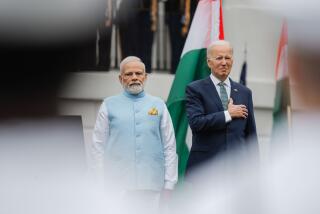Gorbachev, Gandhi Hit ‘Star Wars’ Program
- Share via
NEW DELHI — Soviet leader Mikhail S. Gorbachev and Indian Prime Minister Rajiv Gandhi joined today in blaming the U.S. “Star Wars” program for obstructing progress toward a nuclear-free world.
Gorbachev, who arrived today on a four-day visit, was hailed by Gandhi as a “crusader for peace.”
The two leaders held four hours of talks on nuclear disarmament and international affairs. An Indian spokesman later quoted Gorbachev as saying: “We had very good and far-reaching discussions. We have earned our dinner.”
In a later banquet speech, Gorbachev said his October summit with President Reagan in Iceland “brought into sharp focus both the potential for progress toward a nuclear-free world and the obstacles and forces that block that progress.”
‘Threat Continues’
The talks broke down over Reagan’s refusal to accept the Soviet demand that the Strategic Defense Initiative, or space-based missile defense program, not be tested outside the laboratory.
“The nuclear threat continues to hang over mankind,” Gorbachev said.
Gandhi said in his banquet speech: “It was unfortunate that the Strategic Defense Initiative blocked agreement (in Iceland). Never before had the prospects for peace looked so bright.”
He said that “we resolutely oppose the militarization of outer space” and that security would be “dangerously jeopardized by creating yet another deadly and extremely sophisticated weapons system.”
Share Some Soviet Views
Although India is nonaligned and friendly to both superpowers, it shares many Soviet views on international issues.
Gandhi’s mother and predecessor, Indira Gandhi, signed a treaty of friendship with the Soviet Union in 1971. Gandhi’s first foreign trip as prime minister, in May 1985, was to Moscow, his second to the United States.
In addition to disarmament, a key topic during Gorbachev’s visit is expected to be his July 28 proposal for an Asian-Pacific security plan modeled on the 1975 Helsinki accords on European security.
Gorbachev has said the security plan would seek to reduce the region’s military buildup but he has not elaborated.
More to Read
Sign up for Essential California
The most important California stories and recommendations in your inbox every morning.
You may occasionally receive promotional content from the Los Angeles Times.










